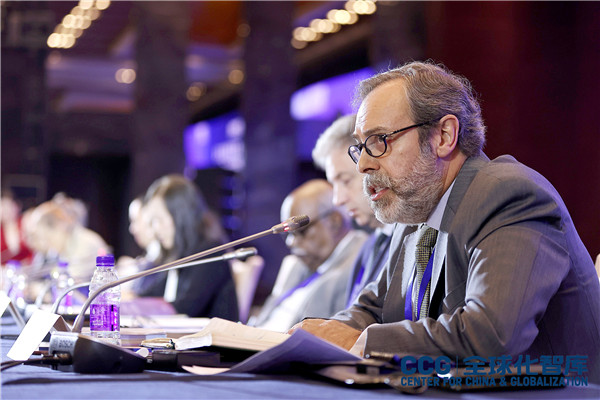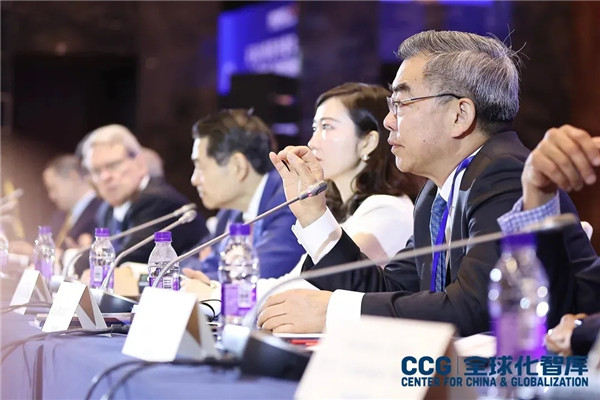CCG Holds the 6th China and Globalization Forum

From November 11-12, 2020, the Center for China and Globalization (CCG) held the 6th China and Globalization Forum in Beijing, China. Participants included leaders from business, academia and research, former senior policymakers, ambassadors to China, heads of international organizations, representatives of chambers of commerce, and noted scholars and entrepreneurs from China and abroad. Over the two-day event, they held in-depth discussions on the various challenges and opportunities for globalization in a period of unprecedented change.
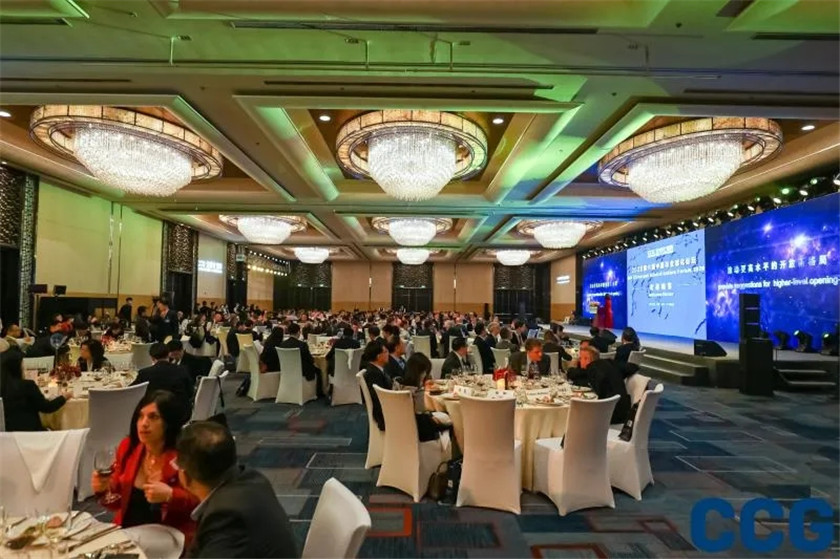
The forum aimed to build consensus and put forward joint policy recommendations for China to comprehensively deepen its reform and opening-up, actively promote globalization and participate in global governance. More than 300 experts took part, including over 30 ambassadors to China and over 40 embassy officials based in China; heads of Chinese multinational chambers of commerce, multinational corporations, Chinese international mainstream media, and international organizations in China; officials from the Ministry of Foreign Affairs, the International Department of the Central Committee of CPC, the State Council Information Office, the Ministry of Commerce, the Ministry of Science and Technology, the Ministry of Human Resources and Social Security, the Ministry of Ecology and Environment, the Chinese People’s Association for Friendship with Foreign Countries, National Immigration Administration; domestic entrepreneurs; scholars and experts from universities, research institutions, and think tanks; and chairmen, advisors and council members of the CCG Advisory Council.
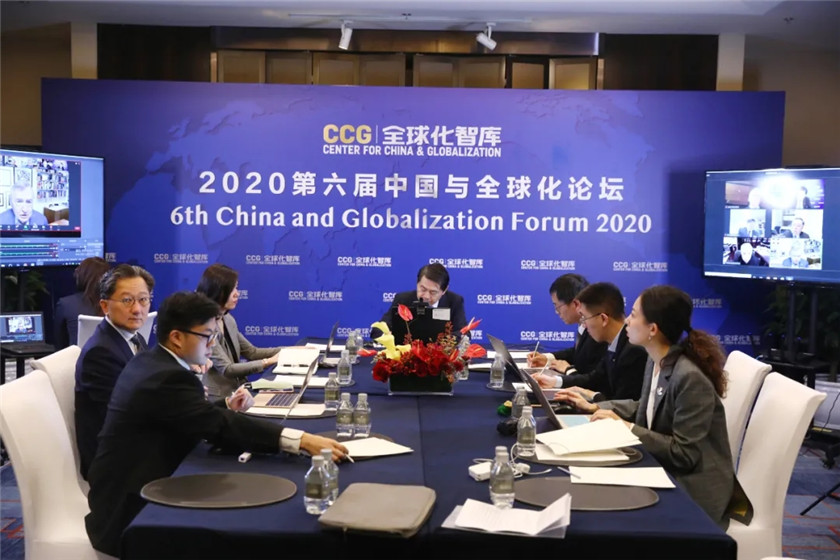
In the US-themed forum titled “What’s Next for the United States and Globalization after the Election?” renowned scholars and former policymakers from China and the US discussed the future of China-US relations, measures to be taken to ease tensions between China and the US, the role of the US administration in global leadership and multilateralism, potential for China-US cooperation, and measures China and the US can take to promote trade, normalize economic relations, and work together against COVID-19.
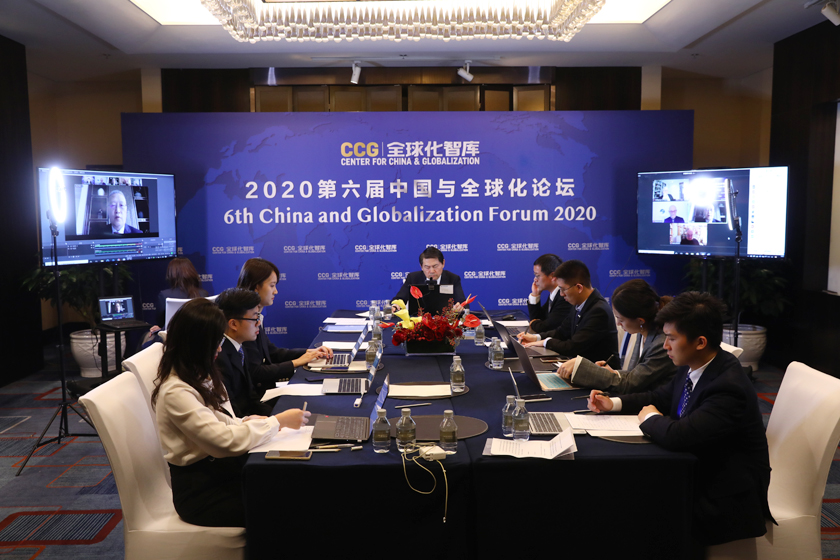
In the Europe-themed forum titled “Europe and Globalization after the US Election: The New Role to Play?” renowned scholars and former policymakers from home and abroad discussed issues including the potential areas for multilateral EU-China cooperation after the US election, the vision and recommendations of the Munich Security Conference (MSC) on cooperation against COVID-19 and future global security, WTO reform with the new Director-General and the new US administration, EU-China cooperation on climate, China’s 14th Five-Year Plan and its impact on global governance, changes facing the G20, the UK and globalization after Brexit, and China-UK economic and trade relations. Participants in the discussion included world-renowned scholars such as Graham Allison, Douglas Dillon Professor of Government of Harvard Kennedy School and coiner of the term “Thucydides’s Trap”; John L. Thornton, Chairman Emeritus of the board of trustees at the Brookings Institution; Kerry Brown, professor and director of Lau China Institute at King’s College, London; Thomas Friedman, author of The World Is Flat and columnist of the New York Times; Pascal Lamy, former WTO Director-General and chair of Paris Peace Forum; Wolfgang Ischinger, chairman of the Munich Security Conference and former German ambassador to the US, as well as leading Chinese experts such as He Yafei, CCG Co-Chair and former vice minister of the Ministry of Foreign Affairs; Ronnie Chan, CCG co-chair and chairman of Hang Lung Properties, and Zhu Guangyao, CCG Advisor and former vice-minister of finance.
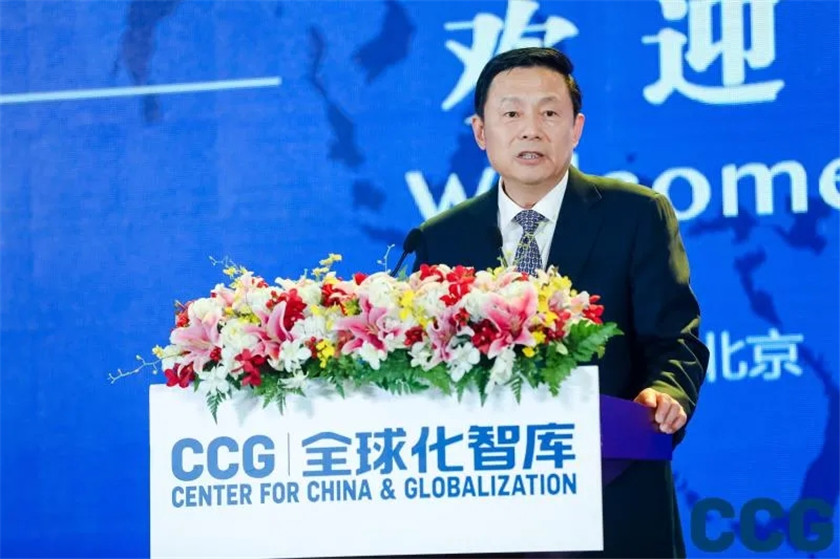
Guo Weimin, vice-minister of the State Council Information Office of China and head of the China Public Relations Association, pointed out in the keynote speech that against the backdrop of the global pandemic and economic recession, China continues to promote the stability and growth of the world economy.
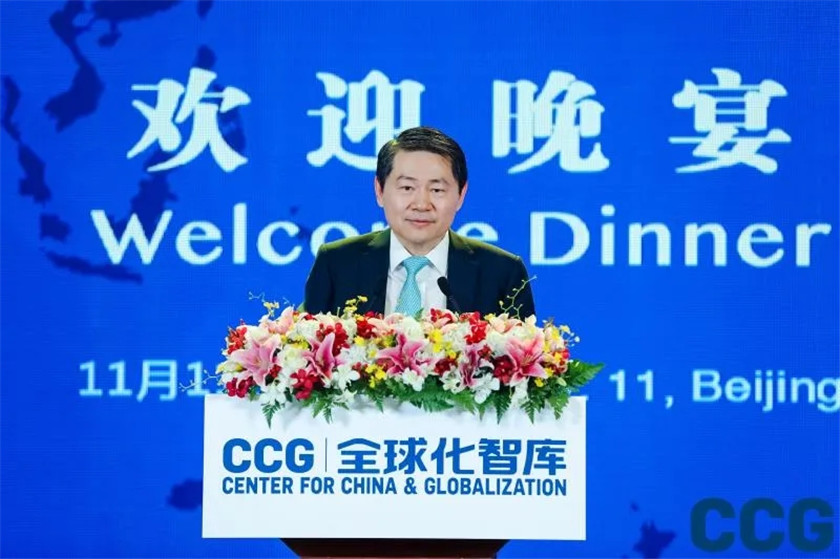
CCG President Wang Huiyao said that the China and Globalization Forum has promoted globalization and China’s role in it together with thought leaders from the fields of policy, industry, academia and research from home and abroad. He said he is honored that this forum hosted by CCG has received the support and attention from various communities.
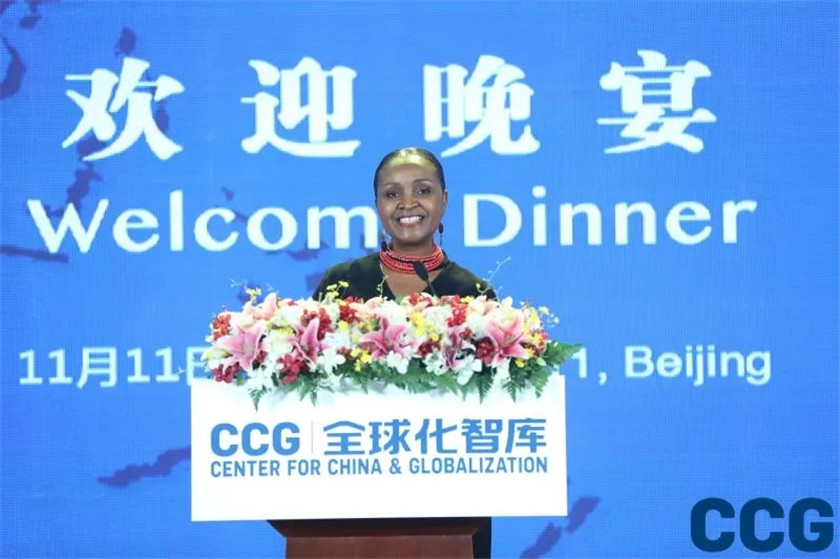
Amakobe Sande, United Nations Resident Coordinator a.i. in China, pointed out in the keynote speech that the world meets the challenges of COVID-19 and anti-globalization and we need sustainable globalization.
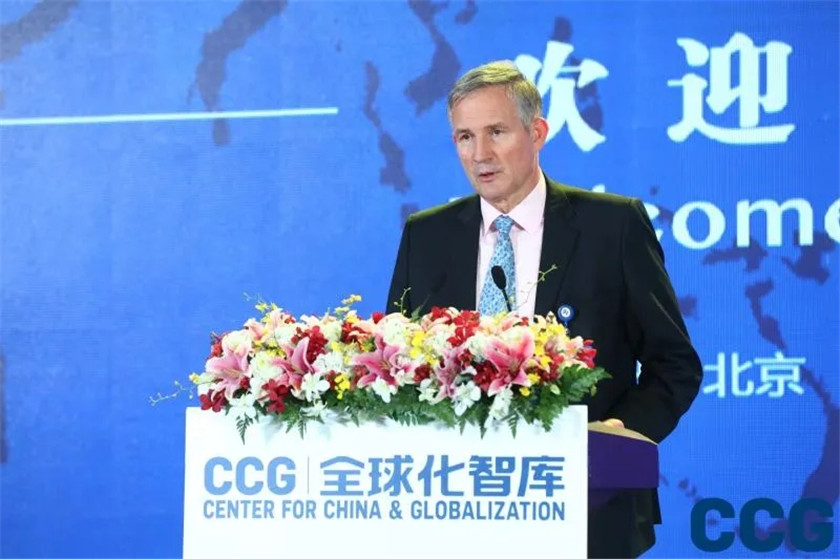
H.E. Laurent Bili, Ambassador of France to China, said that COVID-19 has caused new frictions between countries. The capability of the UN-centered system, especially the WHO, has been questioned and we need to work together to find creative solutions.

Zhang Yichen, CCG senior vice chairman and founder, chairman and chief executive officer of CITIC Capital, said that we need to ensure inclusive globalization and equally distributed benefits.

On November 12, nine roundtable seminars were held, including “Main Forum: China and Globalization in Times of Coronavirus: Trends, Shifts, and Solutions,” “Ambassadors’ Roundtable: US Election 2020: A Pivot Moment for the Future of Global Trade?” “Chambers/CEO Roundtable: Rising Opportunities or New Challenges in the Dual-circular Economy,” “NGOs Roundtable: Chinese and Global NGOs in Changing Context: Challenges and Innovations,” “Business Roundtable: Navigating Globalization Headwinds: Dilemmas and Responses of Chinese Companies,” “Digital Economy Roundtable: The Rise of Digital Economy: Technology and Policy in the Coming Decade,” “Think Tanks’ Roundtable: Great Power Politics in the 21st Century: Choices for China, the United States, and Europe under Biden Presidency,” “CSR Roundtable: Advancing the SDGs in a Global Context: Business Strategies and Experiences,” and the CCG Council Roundtable.

Chen Deming, CCG Honorary Chairman and former Minister of Commerce and chairman of China Association of Enterprises with Foreign Investment, said that China has put forward the “dual circulation” strategy. At present, the Chinese economy faces some challenges, for example, domestic circulation plays an important part in GDP, but takes up little in the consumption structure. To meet people’s pursuit of a better life, China needs to import more products to encourage people’s consumption. He said domestic and international circulation reinforce each other, and that more international capital and companies will be attracted to China. Also, he noted that while the US strategic containment of China continues to escalate, economic decoupling is impossible because, first, China will continue reform and opening-up; second, other economies will not choose sides between China and the US; third, the US will also learn some lessons and take different measures.
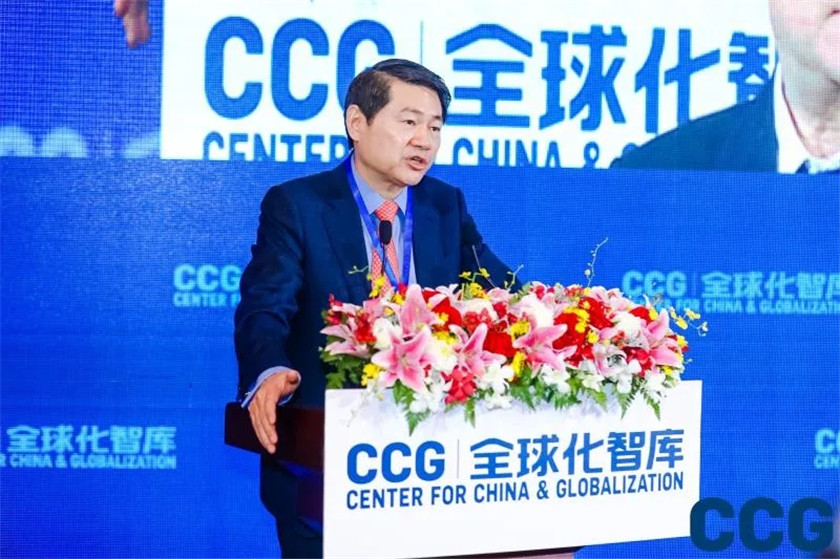
Wang Huiyao said that the theme of the 6th China and Globalization Forum is how we can better promote sustainable globalization and meet new opportunities and challenges in the face of changes unseen in a century such as COVID-19. He anticipated in-depth discussion with a view to forging social consensus and offering policy recommendations for China and the world to promote China’s reform and opening-up and propel globalization.
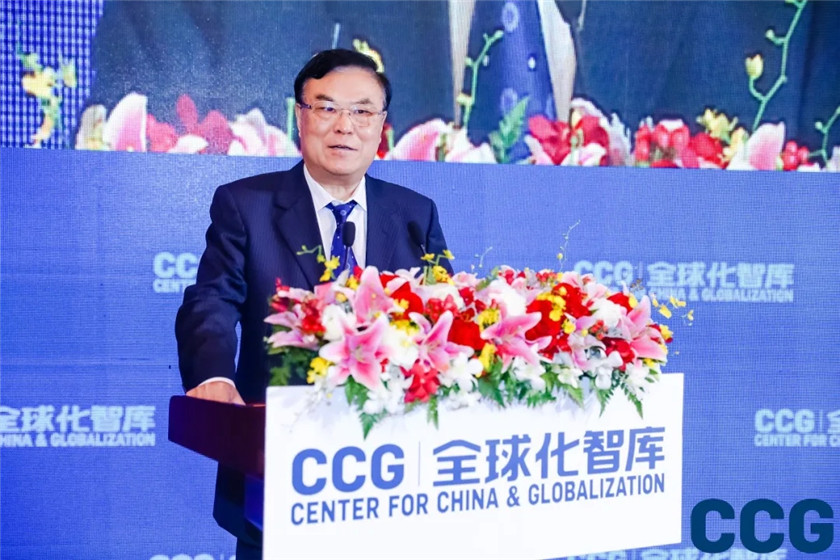
Cui Mingmo, chairman of China Association for International Economic Cooperation (CAFIEC), Ministry of Commerce, said that we need to have a basic understanding of international economic cooperation. Globalization will remain at a low ebb in the future, and the global industrial, supply and value chains are undergoing deep changes. Under such circumstances, regional economic and trade cooperation will usher in more space for development and create new opportunities for enterprises to “go global.” At present, the Belt and Road Initiative with China’s trade and investment cooperation with relevant countries have become the highlights of globalization, and provide a new platform for Chinese enterprises to “go global” and foreign enterprises to develop in China.
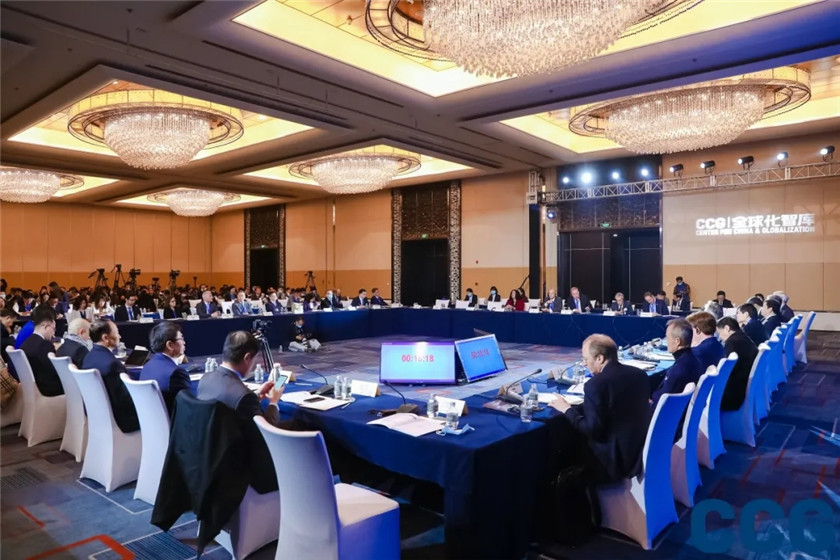

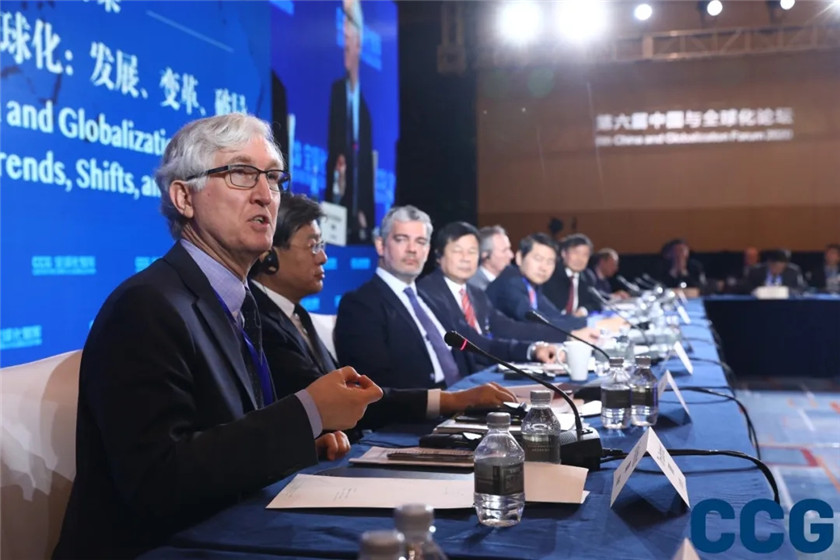
The “Main Forum: China and Globalization in Times of Coronavirus: Trends, Shifts, and Solutions” was held against the backdrop of a global pandemic which has deeply struck the world economy, and brought huge challenges to globalization and global governance. The panelists included Sir Danny Alexander, vice president and corporate secretary of Asia Infrastructure Investment Bank (AIIB); Min. Du Zhanyuan, president of China Foreign Languages Publishing Administration (CIPG); Li Xikui, vice president of the Chinese People’s Association for Friendship with Foreign Countries (CPAFFC); Martin Raiser, Country director for China and Mongolia, World Bank; Tim Stratford, former assistant US Trade Representative for China Affairs, Office of the United States Trade Representative (USTR) and former chairman, Amcham China; Marcos Troyjo, president of the New Development Bank (NDB); Wang Shi, CCG senior vice-chair and founder of China Vanke Co., Ltd; Jonathan Woetzel, director of McKinsey Global Institute and senior partner of McKinsey and Hon. Zhu Guangyao, CCG advisor and former vice-minister of finance. They discussed the future of global infrastructure, multilateral cooperation and globalization, China’s better measures to participate in global governance, the effects of the new US administration on China-US relations, and other topics.
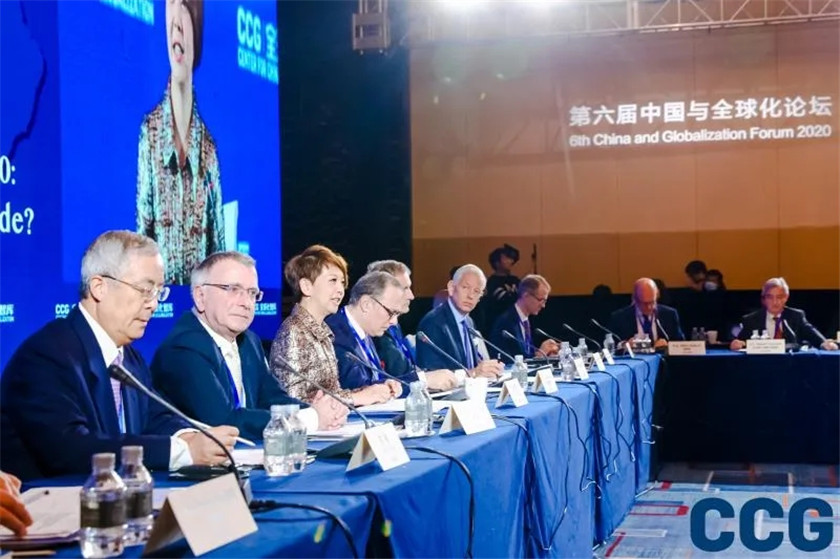
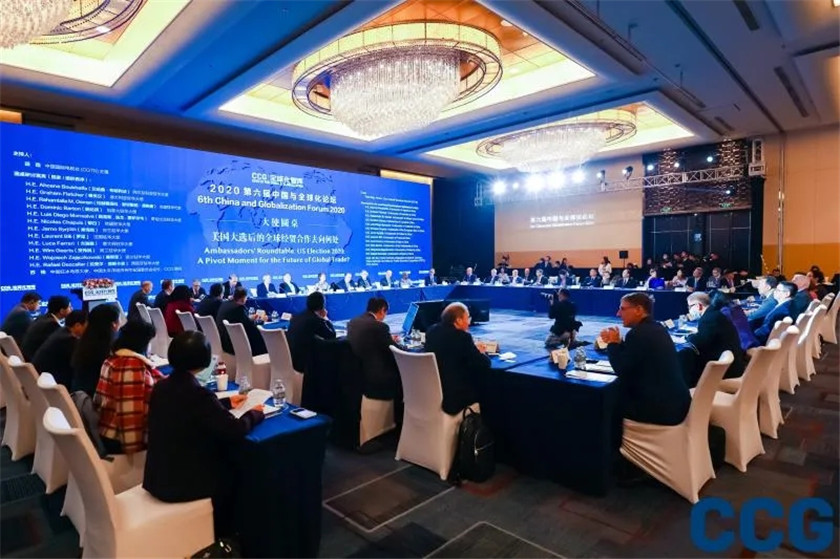
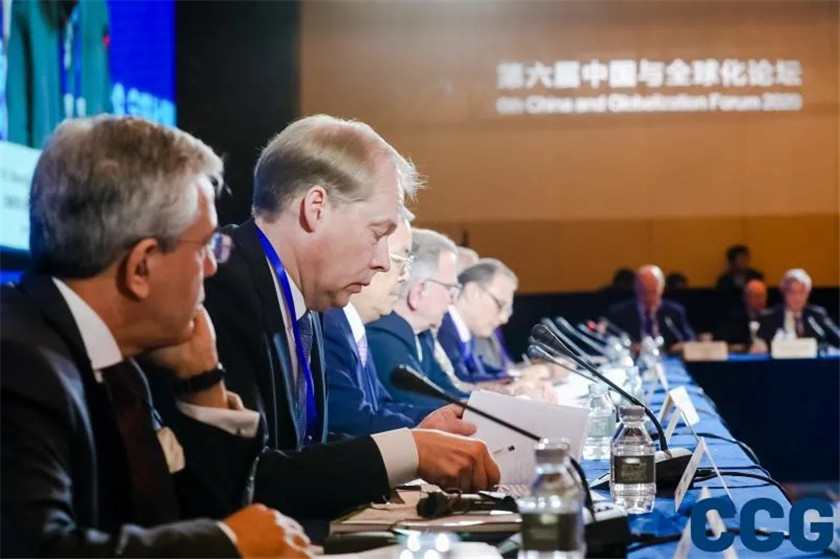
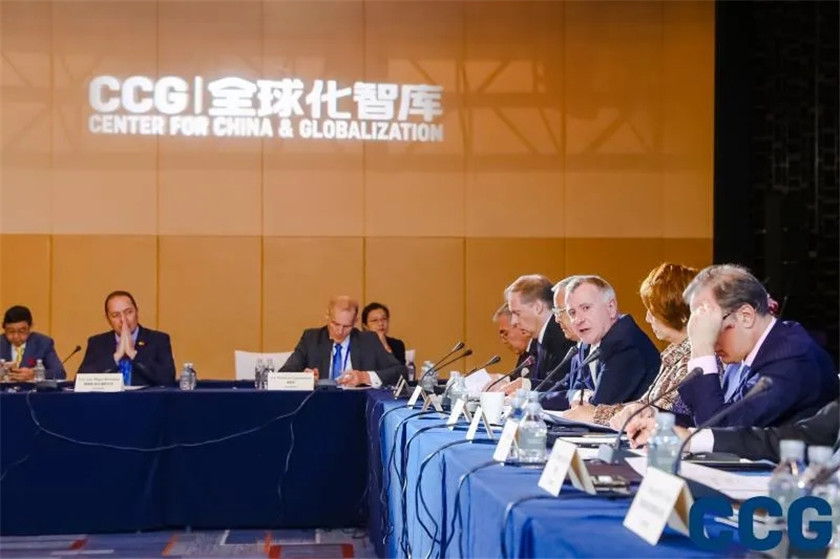
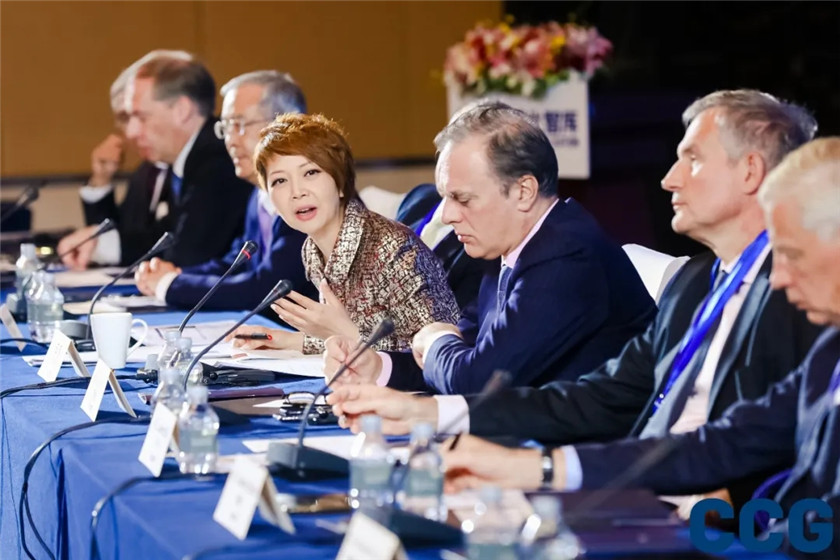
The theme of the Ambassadors’ Roundtable was “US Election 2020: A Pivot Moment for the Future of Global Trade?” COVID-19 has brought new uncertainty to globalization. Over the past few years, global trade has been plagued by rising protectionism, unilateralism and anti-globalization sentiment. The panelists included H.E. Ahcene Boukhelfa, Ambassador of Algeria to China; H.E. Graham Fletcher, Ambassador of Australia to China; H.E. Rahamtalla M. Osman, Ambassador of African Union to China; H.E. Dominic Barton, Ambassador of Canada to China; H.E. Luis Diego Monsalve, Ambassador of Colombia to China; H.E. Nicolas Chapuis, Ambassador of the European Union to China; H.E. Jarno Syrj?l?, Ambassador of Finland to China; H.E. Laurent Bili, Ambassador of France to China; H.E. Luca Ferrari, Ambassador of Italy to China; H.E. Wim Geerts, Ambassador of the Netherlands to China; H.E. Wojciech Zaj?czkowski, Ambassador of Poland to China; H.E. Rafael Dezcallar, Ambassador of Spain to China and Amb. Su Ge, former Chinese Ambassador to Iceland; Chairman, China National Committee for Pacific Economic Cooperation (PECC). They discussed the trend of multilateral cooperation, the direction of reform for the WTO, G20 and other multilateral institutions and mechanisms, proposals and plans for climate change, and the direction of regional cooperation in the next four years. This roundtable was hosted by Tian Wei, anchor of China Global Television Network (CGTN).
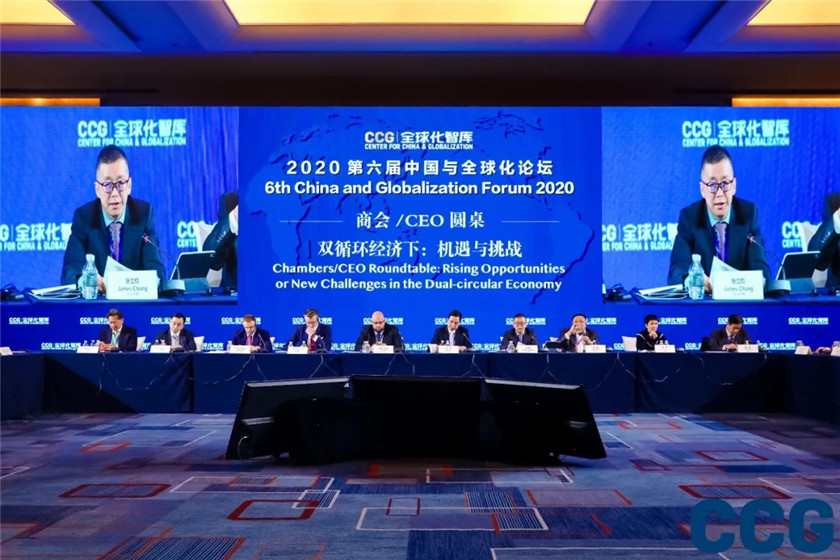
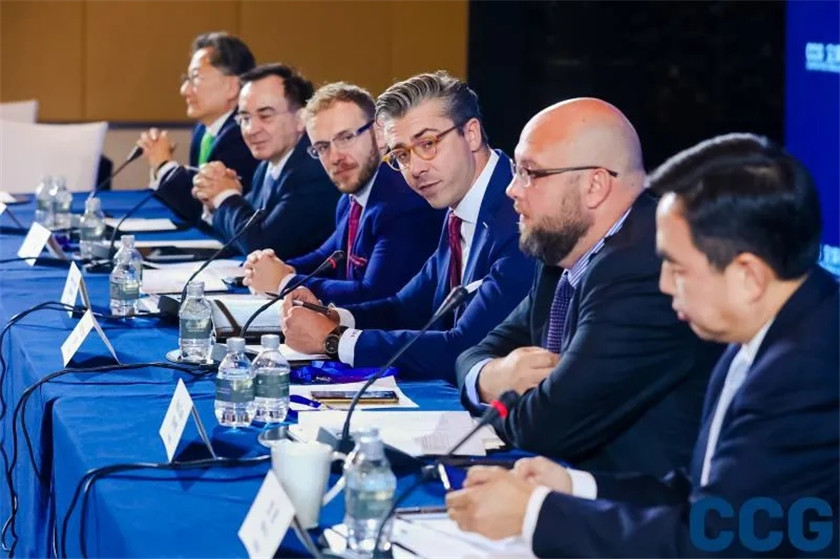
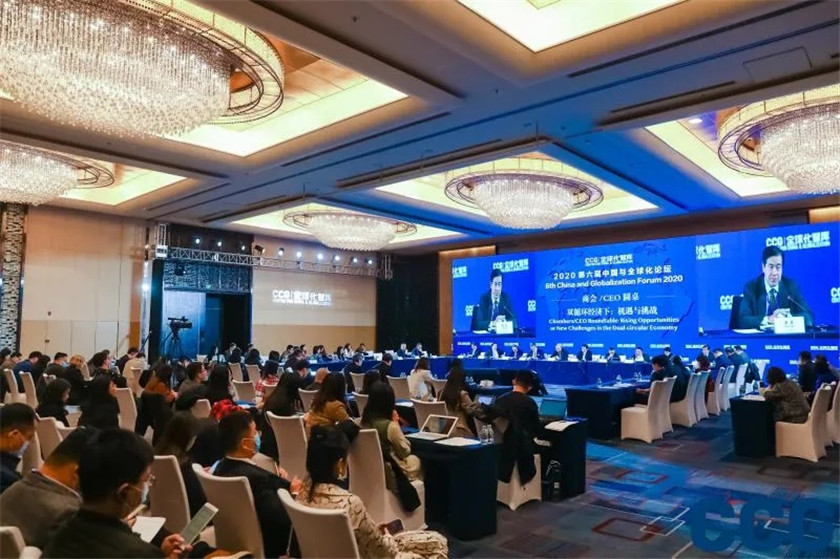
The Chambers/CEO Roundtable was themed “Rising Opportunities or New Challenges in the Dual-circular Economy”. In recent years, people have questioned globalization, prompting much discussion about reshaping market access strategies in the business sector. With the spread of COVID-19, it is of great concern about how firms can remain competitive. The panelists included Lyndon Chao, Managing Director of ASIFMA Equities of Post Trade and China Capital Markets; Nick Coyle, CEO and Executive Director of AustCham China; Noah Fraser, Managing Director of Canada China Business Council; Leng Yan, CCG Senior Council Member and Executive Vice President of Daimler Greater Chinar; LI Ye, CCG Senior Council Member and Vice President of Head of Corporate Affairs and Government Relations of Merck Holding (China) Ltd.; Steven Lynch, Managing Director of BritCham China; Martin Mueller, Chairman of the Board of Swiss Chinese Chamber of Commerce in China; Tom Simpson, Managing Director of China Operations & China Chief Representative, China-Britain Business Council; Wang Jing, Vice President of Government Affairs, IBM Greater China; Tom Hsu, CCG Senior Council Member and Global Vice President of Wasion Group; James Zhan, President of Tata Group China; James Chang, PwC Consulting Greater China CEO; Zhao Bin, CCG Senior Council Member and Senior Vice President of Legal and Corporate Affairs for Qualcomm. They discussed how enterprises can seize new opportunities in the 14th Five-Year Plan, and the role of chambers in global supply chains and multinational corporations in the dual-circulation economy. The roundtable was hosted by Mike Liu, CCG Vice President and former Managing Director of DXC Technology Greater China.
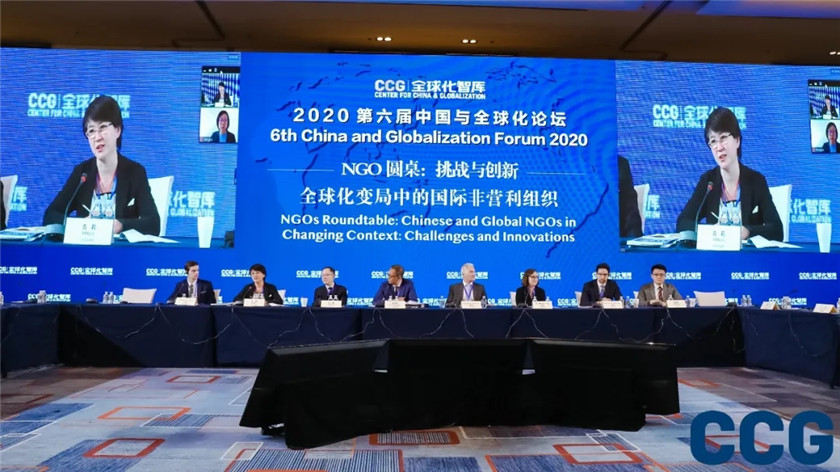
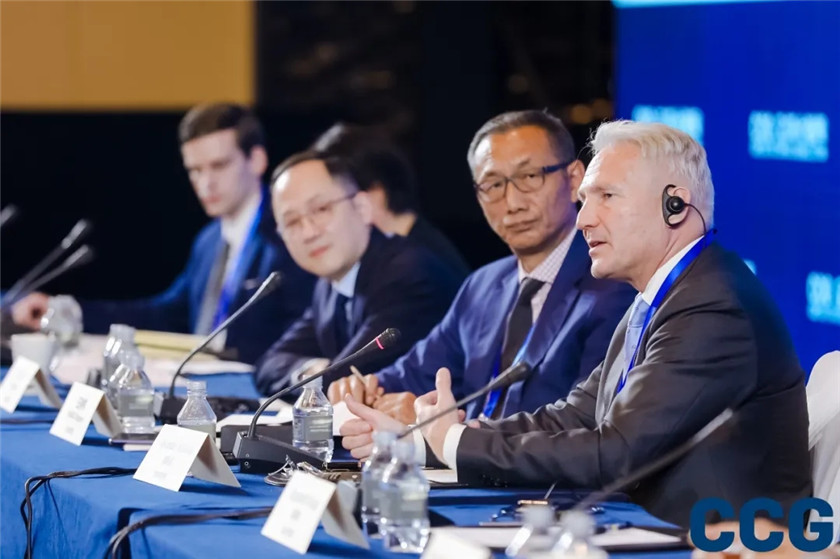
The NGOs Roundtable was themed “Chinese and Global NGOs in Changing Context: Challenges and Innovations”. In 2020, international NGOs have played a great role in global cooperation to address COVID-19, and Chinese NGOs have made positive contributions to the growth of the Chinese economy and friendly exchanges between China and the rest of the world. The panelists included Alexander Badenheim, Representative of Konrad-Adenauer-Stiftung in Beijing; Fang Li, Director of World Resources Institute (WRI) China; Ji Hongbo, Country Representative of The Asia Foundation, Beijing Office; Alexander Kallweit, Resident Representative for Friedrich-Ebert-Stiftung (FES) China; Elizabeth Knup, Regional Director of Ford Foundation, Beijing Office; Paul Joscha Kohlenberg, Chief Representative of Heinrich-Boell-Stiftung Beijing Representative Office; Shen Xin, Director-General of American & Oceanian Affairs, the Chinese People’s Association for Friendship with Foreign Countries (CPAFFC) and Zhao Xiuye, Director of Asian Programs, the State Legislative Leaders Foundation (SLLF). They discussed how to promote sustainable and inclusive globalization, how NGOs can play a better role in combating COVID-19, in China’s 14th Five-Year Plan and in strengthening people-to-people exchanges between China and the rest of the world. The roundtable was hosted by Wang Xiangwei, former Editor-in-Chief of South China Morning Post.

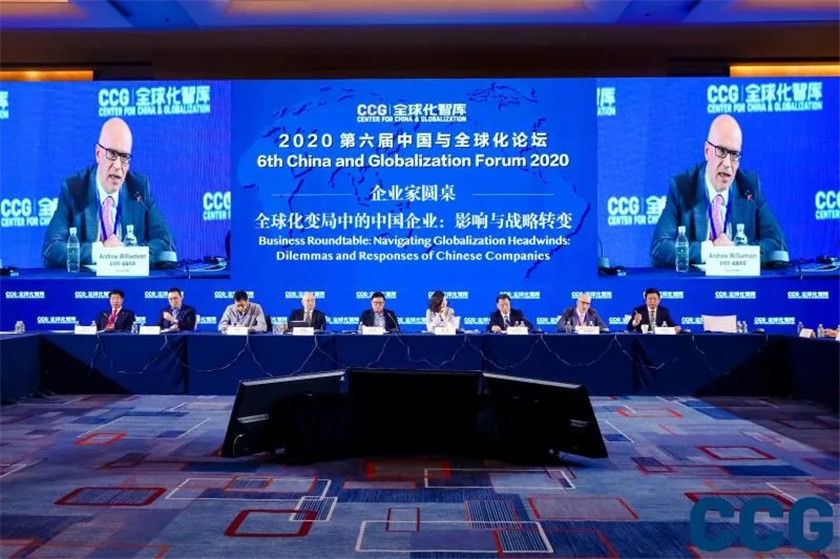

The Business Roundtable took “Navigating Globalization Headwinds: Dilemmas and Responses of Chinese Companies” as its theme. The COVID-19 pandemic is compounding the turbulence of the global economy, adding a lot of uncertainty for enterprises. Firms the world over are now faced with unprecedented challenges. Entrepreneurs taking part were Michael Kuan, CCG Vice-Chair, Founder & Chairman of Kuan Capital; Marvin Hong Ming-Kei, CCG Senior Vice Chair, Vice Chairman of Hung’s Group, Executive Director & CEO of Hop Hing Group Holdings Limited; Lang Hua, Board Director of Far East Holding Group, President & Chief Investment Officer of Far East Smart Energy Co., Ltd.; Shi Yang, CCG Vice-Chair, Founder of Zhejiang Honghui Asset Management Co. Ltd.; James Ni, Chairman & President of MLily Limited; Wang Guangfa, CCG Senior Vice Chair, Chairman of Fazheng Group, Principal of Beijing Royal School; Andrew Williamson, Vice-President & Economic Advisor of the Government Affairs of Huawei Technologies; Zhang Huarong, CCG Vice Chair, Chairman of Huajian Group. Topics discussed included new opportunities in the 14th Five-Year Plan period, how Chinese enterprises can achieve sustainable innovation to enhance their core competitiveness, and how companies should respond to the COVID-19 pandemic. This roundtable was hosted by Dr. Miao Lu, CCG Vice President and Secretary-General.
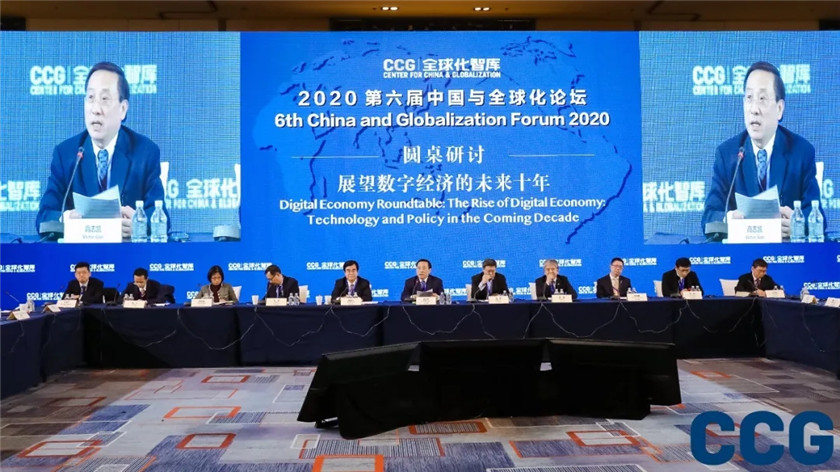
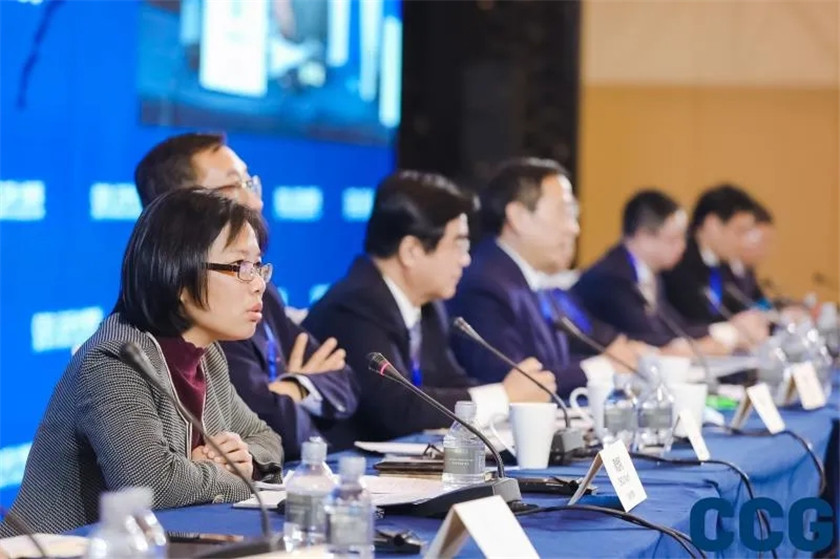
The Digital Economy Roundtable, “The Rise of Digital Economy: Technology and Policy in the Coming Decade,” focused on how digitalization became a major thrust for global economic development in 2020. With great tenacity and adaptability, the digital economy is revolutionizing dynamic forces in every field, providing new potential, opportunities, risks and challenges in economic recovery and future growth. Panelists included Chen Poujian, CCG Executive Council Member, CEO of China Horae Capital Management Group and Chairman of Ruihua Health Assurance Corporation; Cui Fan, CCG Non-resident Senior Fellow and Professor, School of International Trade and Economics at University of International Business and Economics (UIBE); David Jia, Chairman of LKK Innovation Design Group and Founder of LKKER Sharing Design Platform; Liu Qingyun, Director of Strategic Investment of JD Group; Lu Benfu, Vice Chairman of China Institute for Innovation & Strategy Development; Ma Jian, Deputy Country Representative of UNIDO; Sun Jie, CCG Non-resident Senior Fellow and former Director-General of Fund Supervision Department of CSRC and former Chairman of Asset Management Association of China; Tang Min, CCG Vice President and Counselor of States Council of the People’s Republic of China; Zhou Nianli, CCG Non-resident Senior Fellow, Professor of University of International Business and Economics and Member of National Working Group on Digital Trade, and Zhou Yanli, CCG Advisor and former Vice Chairman of China Insurance Regulatory Commission. They discussed the progress made in the digital transformation of traditional industries and the opportunities and challenges faced during the 14th Five-Year Plan period, as well as how technology enterprises can assume more social responsibility and ensure technology has a beneficial impact. The roundtable was hosted by CCG Vice President Victor Gao.
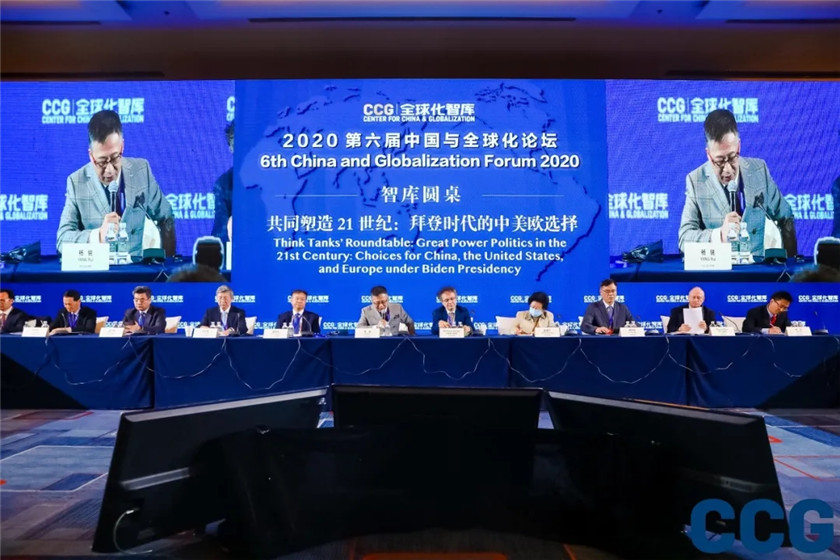
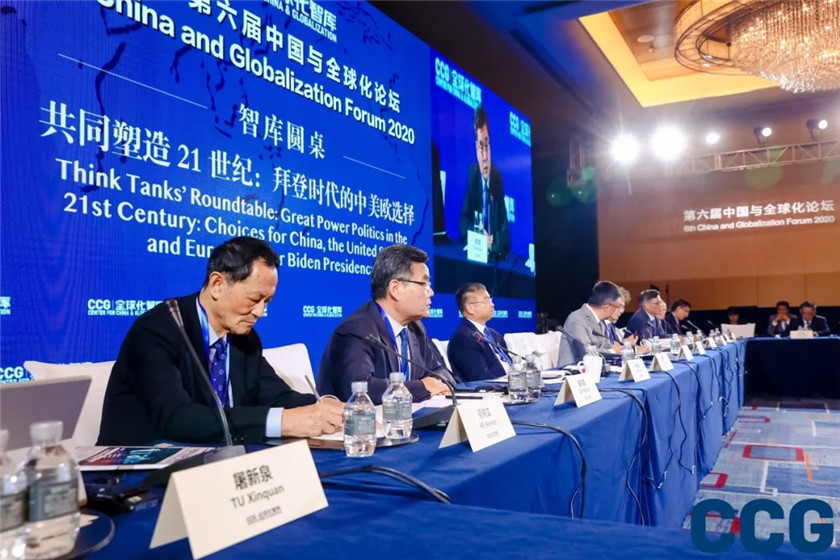
The Think Tanks’ Roundtable, “Great Power Politics in the 21st Century: Choices for China, the United States, and Europe under Biden Presidency,” talked about the challenges arising from the deteriorating China-US relationship and changing China-Europe relations. Panelists included David Blair, CCG Vice President and Senior Economist; Cao Jinghua, Executive Director of Alliance of International Science Organizations (ANSO) Secretariat, former Director General of the Bureau of International Coop (BIC), the Chinese Academy of Sciences (CAS); Chen Wenling, CCG Expert Advisor and Chief Economist of China Center for International Economic Exchange (CCIEE); Cui Hongjian, CCG Non-Resident Senior Fellow, Senior Research Fellow and Director of the Department of European Studies, China Institute of International Studies (CIIS); Fu Mengzi, Vice President and Research Professor of China Institutes of Contemporary International Relations; Michele Geraci, former Undersecretary of State of Italian Ministry of Economic Development; He Weiwen, CCG Senior Fellow and former Commercial Counselor of the Chinese Consulates General in New York and San Francisco, the United States; Sun Yongfu, CCG Senior Fellow and former Director General of the Department of European Affairs, MOFCOM; Tu Xinquan, CCG Non-Resident Senior Fellow and Professor and Dean of China Institute for WTO Studies, University of International Business and Economics, and Xie Tao, CCG Non-Resident Senior Fellow, and Dean and Professor of School of International Relations, Beijing Foreign Studies University. Discussion topics included visions for a China-US-EU trilateral relationship, whether these three players could cooperate consistently on matters such as global COVID-19 pandemic, and competition in the technology field. This roundtable was hosted by Yang Rui, CCG Non-Resident Senior Fellow, former Host of Dialogue and CGTN; Partner of TMT Post.


The CSR Roundtable “Advancing the SDGs in a Global Context: Business Strategies and Experiences” focused on sustainable development. As an indispensable part of international cooperation, the 17 UN 2030 SDGs form a common vision for all countries, boosting their resolve to eradicate poverty, save the planet, and build a world of peace and prosperity. In the face of climate change, COVID-19 and other global problems, the world needs to rev up the transition to sustainable development solutions. Panelists included Claire Courteille-Mulder, Director, ILO Country Office for China and Mongolia; Gao Min, CCG Senior Council Member, Vice Chairman of the China Garment Association and CEO of Hempel Group China; Shauna Huang, Vice President of External Affairs of Universal Pictures China; Luo Xin, Chairman and President of GCL System Integration Technology Co., Ltd; Min Zhidong, President of Bright International Food Industry Fund, Bright Frey Capital (Shanghai) Co.Ltd; Jacques Pellet, Regional Director for East Asia, International Committee of the Red Cross (ICRC); Zhang Ke, Secretary-General, Tanoto Foundation China; Zhang Yunzhou, President of State Grid Energy Research Institute; Zhou Guomei, Secretary of the Party Committee of external Cooperation and Exchange Center, Ministry of Ecology and Environment and Deputy Secretary-General of the China Committee for International Cooperation on Environment and Development. Russell Flannery, Editor-in-Chief of Forbes China, was the chair. The roundtable saw a thorough discussion over innovation and reforms in sustainable development, international cooperation in energy transformation and promoting carbon neutrality, and enterprises’ methods to expand cooperation with governments, international institutions, think tanks and other non-governmental organizations.
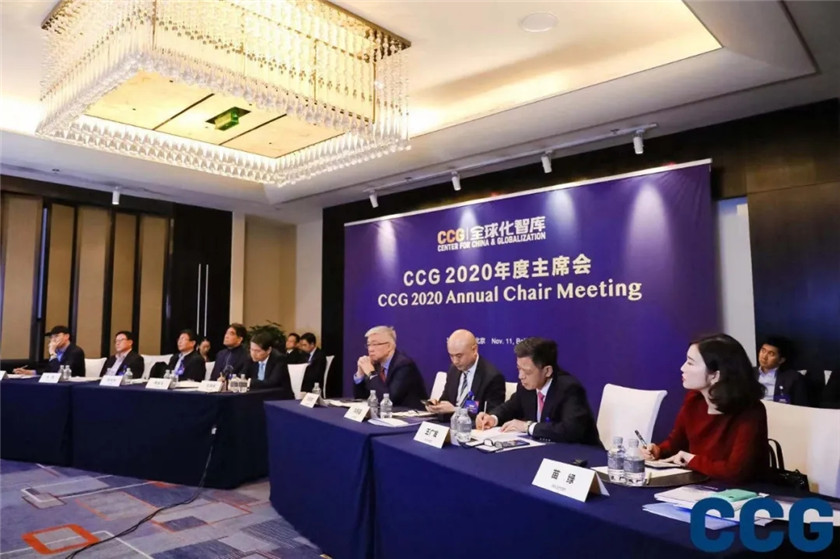
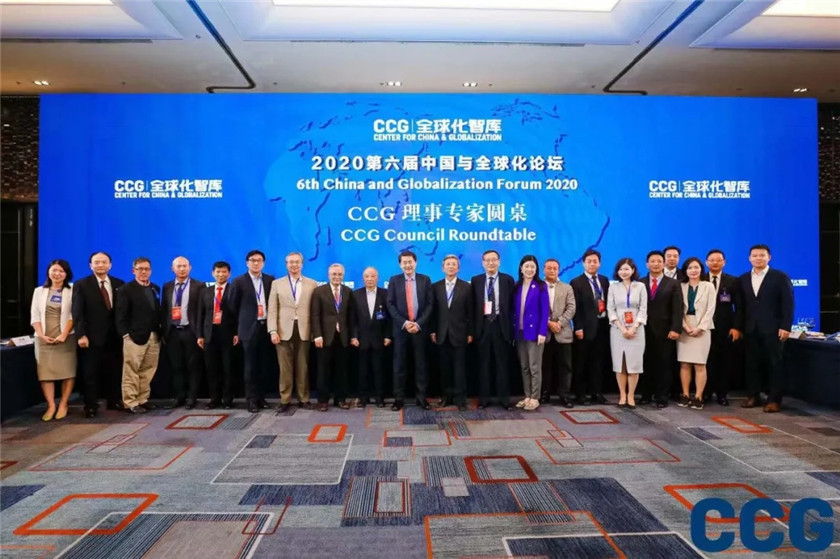
During the forum, CCG also hosted the 2020 Annual Chair Meeting and Council Roundtable, at which it reviewed what CCG had accomplished in 2020, and proposed CCG’s plans for development.
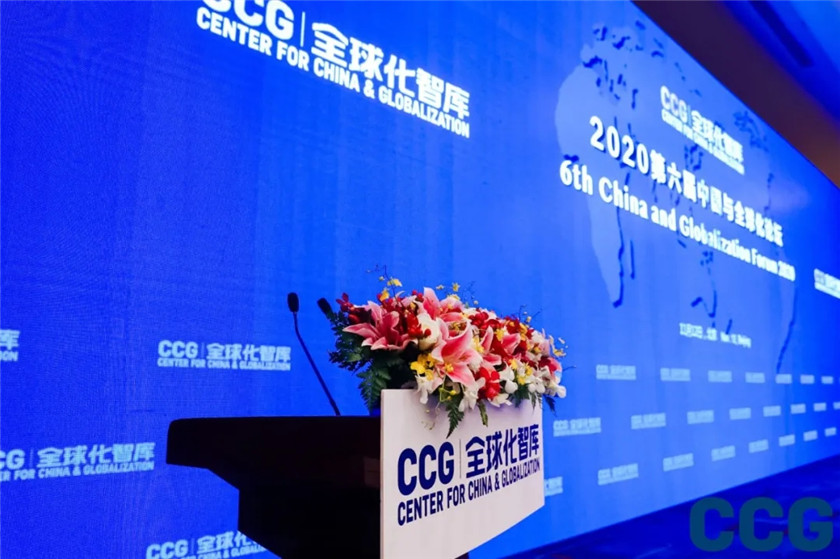
The China and Globalization Forum is the first think tank-hosted forum initiated and founded by CCG to focus on a shared destiny for all humankind and China’s globalization development.
It has been successfully held for five consecutive years since its establishment in 2015. As one of the few high-profile international forums hosted by a think tank in China, the China and Globalization Forum seeks to promote international dialogue and cooperation. It focuses on key topics every year and developments in economic globalization. Every year, hundreds of experts from home and abroad in the field of globalization participate in the forum to jointly deepen China’s reform and opening up, actively promote globalization and participate in global governance, and build social consensus for future globalization. Dignitaries, envoys of many countries in China, representatives of international organizations, and noted scholars attend the forum to give speeches and exchange ideas. This forum is hosted by CCG, co-organized by the Chinese Society for International Economic Cooperation of the Ministry of Commerce, and supported by the Beijing Dongyu Globalization Think Tank Foundation, the Adenauer Foundation, Asia Foundation, McKinsey Global Institute, and Hang Lung Properties.
